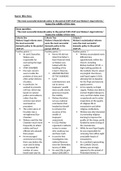Name: Bliss Ross
‘The most successful domestic policy in the period 1509-1529 was Wolsey’s legal reforms.’
Assess the validity of this view.
Essay question:
‘The most successful domestic policy in the period 1509-1529 was Wolsey’s legal reforms.’
Assess the validity of this view.
Criteria One Criteria Two Criteria 3
Wolsey’s legal reforms were Wolsey’s financial reforms Wolsey’s ecclesiastical reforms
the most successful were the most successful were the most successful
domestic policy in the period domestic policy in the domestic policy in the period
1509-29. period 1509-29. 1509-29.
Positive points 😊 Positive points 😊 Positive points 😊
As Lord Chancellor, Henry VIII did not Wolsey accumulated many
Wolsey was inherit his father’s different key
responsible for keen financial mind, appointments within the
overseeing the legal so Wolsey was Church, including
system. tasked with the Bishop Cardinal (1515), a
STAR CHAMBER. handling of the high-ranking position in
His main concern Crown’s finances. the Catholic Church, above
was to tackle the ADMINISTRATION any English churchman,
problem of slow and OF THE SUBSIDIES and Papal Legate (1518),
often unfair delivery Local allowing him to deputise
of justice. commissioners sent for the Pope and exercise
In particular, he out to assess papal powers.
wanted to promote taxpayers’ wealth In his capacity as Papal
civil law, which was were usually overly- Legate, Wolsey was able to
based on natural generous towards instruct English bishops to
justice and evidence, the nobility. carry out their duties more
rather than the Wolsey therefore scrupulously and to order
common law which set up a national inspections of the quality
was based on commission that of religious life in
precedent. headed by himself monasteries and other
The centre piece of to enhance the religious institutions.
his plans was a accuracy of the Wolsey was also interested
strengthened Star wealth of in promoting religious
Chamber. taxpayers’ learning to improve the
Wolsey used the Star assessment. quality of the clergy, partly
Chamber much more In 1522 Wolsey funded by some closing of
frequently to attack organised a national the monasteries.
nobles and local survey to assess While he was Papal Legate,
officials who abused who could pay tax he was responsible for
their power. and how much. removing from office eight
He encouraged It was the first unsuitable heads of
commoners to bring investigation into monasteries.
their case before the national finances As a cardinal representing
court and in doing since the Domesday the Catholic Church,
so, increased the Survey of 1086. Wolsey was strongly
number of cases He used this to gain opposed to the spread of
heard each year by about £200,000 in Protestant heresy in
, about 120. forced loans in England, and encouraged
The strengthened 1522-23. Henry to take a stand
Star Chamber was THE SUBSIDY against the new ideas of
part of the legacy This was a more the German reformer,
Wolsey left; it wasn’t flexible tax. Martin Luther.
abolished until 1641 It had to be The above led to public
in the reign of approved by the burnings of Lutheran texts,
Charles I after abuses House of Commons which started outside St
of power. which met in 1523, Paul’s in London in May
He also used the but was based on 1521, with Wolsey
Court of Requests to income rather than personally present, holding
hear cases from the property, similar to in his hand the unfinished
poor people. It was modern income tax. manuscript of Henry VIII’s
popular because of AMICABLE GRANT book against Luther for
the low cost of In 1525, Wolsey which Henry was rewarded
bringing a case and proposed an with the title ‘Defender of
because decisions ‘Amicable Grant’ the Faith’ by the Pope.
were made quickly. from both the
His legal reforms Church and
earned Wolsey the ordinary taxpayers
reputation of being a based on his
friend to the poor- valuations of their
mass support, less property.
chance of revolt… In March and April
COURT OF 1525, the
CHANCERY government sent
The role of Chancery out commissioners
was to apply the to order the
principle of ‘equity’ collection of the
(fairness) rather than Amicable Grant.
a strict reading of the They were
common law. instructed to tax
Cases over enclosure the laity between
were dealt with here, one-sixth and one-
contracts and land tenth of the value
left in wills. There of the goods they
was a backlog of owned, and to tax
cases, however. The the clergy at one-
Court was slow due third of the value of
to its popularity. their goods.
Wolsey had the right They gave people
to preside over the just ten weeks to
Chancery (he sat as find the necessary
a judge, however his money.
other duties often
meant he had to be
deputised in this
position).
Wolsey heard 7,526
cases in the
Chancery.





